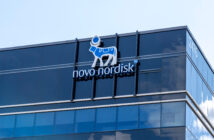Pfizer is seeking a legal blessing in favor of proposed programs that would allow the company to directly cover copays for Medicare patients taking the cardiovascular drug tafamidis. Last year, the company filed a federal lawsuit seeking to test national policies that prohibit drug companies from offering Medicare patients direct copay assistance or providing financial help through a charity funded by Pfizer.
However, critics of Pfizer’s position in the lawsuit, like Justice Department lawyer Jacob Lillywhite, insist that a ruling in Pfizer’s favor would reverse decades of legal precedent and agency regulation and “bless [Pfizer’s program to induce Medicare beneficiaries to purchase” medications like tafamidis. Moreover, Lillywhite and other Justice Department officials say that since Medicare does not directly negotiate prices, a ruling in Pfizer’s favor could have profound implications for drug costs and government enforcement of anti-kickback laws. For example, suppose pharmaceutical companies are allowed to cover copays. In that case, patients will likely move toward those companies’ medications, physicians will prescribe drugs they know are low-cost or free, and taxpayers will be on the hook for most of the expenses.
Under federal law, pharmaceutical companies offering anything of value to encourage Medicare patients to take their medications risk violating such laws. Over the past few years, the Department of Justice has collected more than $1 billion in settlements from pharmaceutical companies, including Pfizer, that allegedly violated anti-kickback laws and undercut Medicare’s co-pay system intended to help counter inflated drug prices. For example, in December, Biogen agreed to pay $22 million to resolve claims that it illegally used two 501(c)(3) foundations as conduits to cover copays of Medicare patients taking two of its multiple sclerosis drugs Avonex and Tysabri.
Many consider tafamidis to be just one more overpriced drug with no competitors intended primarily for Medicare patients. The drug, sold under the names of Vyndamax and Vyndaqel, is currently the only medication approved by the U.S. Food and Drug Administration (FDA) to treat the potentially fatal heart condition Transthyretin amyloid cardiomyopathy (ATTR-CM).
During oral arguments on June 22, even the judge presiding over the Pfizer case, Mary Kay Vyskocil, questioned why the drug has such a high price tag. The judge asked a simple question: “Why doesn’t Pfizer just reduce the cost of the drug?” instead of waging expensive battles in court to help with patient copays. Tafamidis costs $225,00 annually, with Medicare patients paying about $13,000 out of pocket for the drug. As a result, Lillywhite says Pfizer has effectively priced itself out of the market.
“It has priced the drug so high that most people who are eligible for that drug cannot purchase it,” he said. Under Medicare’s Part D prescription benefit, seniors must spend $6,550 out of pocket before reaching “catastrophic” coverage. However, they are typically still responsible for 5% of a drug’s cost, with no price cap, and once they reach the catastrophic phase, Medicare covers 80% of the drug cost, and Part D pays the remaining 15%.
Researchers say that patient-assistance programs that cover out-of-pocket costs remove a powerful market force—patients’ price sensitivity—that would otherwise push down drug prices, and drug makers use these programs to increase sales of costly medications. There is little doubt that that tafamidis is a massive moneymaker for Pfizer. The drug generated $453 million in global revenue for the company in the first quarter of 2021, up 88% from the previous year.
If Pfizer’s lawsuit is successful, it will open the door for other pharmaceutical companies looking to take advantage of copy programs, potentially sending drug prices skyrocketing. Greg Shapiro, a partner at whistleblower law firm Newman & Shapiro, told MarketWatch last month, “If pharmaceutical companies don’t have to think about copays when setting prices, then the sky is the limit.”






